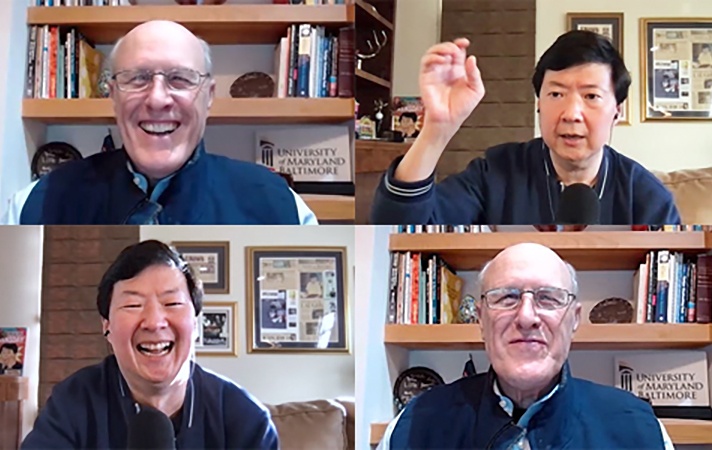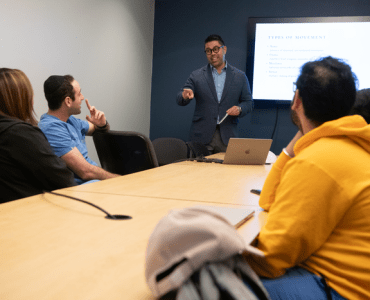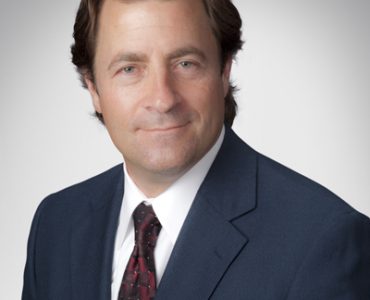Ken Jeong, MD, joined the University of Maryland, Baltimore (UMB) alumni community for a frank and wide-ranging discussion with UMB President Bruce E. Jarrell, MD, FACS, about why he left medicine to become a comedian, his breakout role — as a doctor, of course — in the movie Knocked Up, the responsibility he feels for helping other Asian Americans in show business, and how he loves that viewers think he’s the dumbest judge on the Fox show The Masked Singer. The actor, writer, and producer, who also is known for his TV show Dr. Ken and roles in movies such as The Hangover, spent about an hour talking via videoconference Feb. 23 with Jarrell, cracking jokes in a few rare moments. Jarrell noted at the end “there is such a thing as a serious comedian.”
Here are five lessons learned from the alumni event:
- A good mentor can mean everything.
Jeong praised his medical residency director, Dr. Donald Erwin, at Ochsner Foundation Hospital in New Orleans, who, instead of discouraging his love for comedy, embraced his uniqueness. Erwin told him during his interview, “You’ll be a better doctor because of your comedy skills. There could be a world where you could do comedy full time, and your medicine will help you with your comedy.” Jeong added, “He said, ‘Think of it as blending. You’re blending your medicine and your comedy, and you’re blending your comedy and your medicine. They’re not mutually exclusive.’ He really gave me a Zenlike attitude of making your hobby your work and making your work your hobby. Your whole life is a tapestry of blending whatever gifts that you have, and I think every individual has that.”
- Medicine and comedy have more in common than you might think.
Jeong talked about how he improvises in his acting, and the parallels he sees with medicine. “On movies like The Hangover and Knocked Up, both directors wanted their actors to improvise and it was almost an expectation, so that’s how I cut my teeth in the business. I had the ability to act, but I could also improvise dialogue. After a while I was given a lot of trust.” He then equated that with how doctors have to trust their instincts, use their playbook from experience, and sometimes “call an audible.” When his wife had breast cancer and they were exploring treatment options, her oncologist told them that with “ ‘certain aspects of this treatment, we’re going to have to improvise.’ And I found peace with that because I trusted him.”
- Representation matters.
Jeong called his role in the movie Crazy Rich Asians “maybe the most important role I’ve ever done in my career.” He said, “This is something for future generations. You want to show representation on screen so my daughters can see strong Asian American female role models and to tell Asian Americans you can have a career in the arts as well, and the sky is limitless.” He would have been content if his small role had been cut because “we’re all contributing to this verse of how important it is that representation matters, and how diversity is what makes America great.”
- Take the risk.
Jeong filmed Knocked Up while he was still a practicing physician before his wife and his parents encouraged him to quit his day job to pursue acting full time. “I feel like everything happened the way it was supposed to happen. I think that you really don’t know until you know, and years ago, there was always definitely intimidation, fear in leaving your day job to embark on something that has absolutely no guarantee.” He thought when he made the decision: “You can’t be afraid of a shot that you haven’t taken yet. It’s OK if you fail; at least you tried it.”
- Happiness is around the corner.
Jeong returned to work on The Masked Singer and I Can See Your Voice during the pandemic and discussed the protocols those productions have used. He said he was initially nervous and though it can be nerve-wracking, he and his colleagues are focused on making a safe show. With the COVID-19 vaccines now available, he pointed out, “I think what’s missing now is to be optimistic. It’s been a year, and at this point we need to remind ourselves happiness is coming. It’s just around the corner.”




